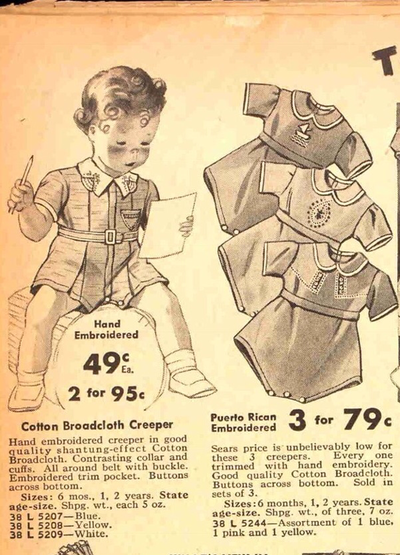Rompers, jumpsuits, overalls and the like all have a few advantages that make them attractive enough to appear in the fashion pages on a regular basis. They also have aesthetic and practical drawbacks that each generation seems destined to rediscover. To begin with the advantages:
|
What is the appeal of rompers? The original rompers were designed as playclothes for infants and toddlers as a time when the standard clothing for children under the age of five years was dresses. Like dresses, rompers were one-piece, which was desirable for mothers who believed that children could be "spoiled" by too much handling. Compared with ankle-length skirts worn by young walkers, rompers allowed more freedom of movement. That's fine, but we now have many other options, and we no longer believe that babies are harmed by being handled in the process of getting dressed. But the image of romper as a childish style persisted, and has influenced adult casual wear.
Rompers, jumpsuits, overalls and the like all have a few advantages that make them attractive enough to appear in the fashion pages on a regular basis. They also have aesthetic and practical drawbacks that each generation seems destined to rediscover. To begin with the advantages:
3 Comments
No sooner had the RompHim appeared, but it was the target of criticism and humorous memes. My own objection to the name was that it joined a growing list of unnecessarily gendered style terms -- man bun, boyfriend jeans and the like -- that seemed to signify a transgression of gender rules. Since rompers have a long history of unisex and masculine design, it seemed an odd choice. Of course, ACED Designs probably intended to give their project a rebellious aura and make clear the intended market for the RompHim: men so secure in their masculinity that they can and will wear anything. Men like James Bond. Ridicule plays an important role in policing men's appearance and behavior. It can be the first warning a boy or man gets that if he persists, he risks harassment and ultimately violence. In my long ago dissertation research, I studied how cartoons making fun of older, more formal styles helped accelerate the transition to the modern business suit. Psychologists who have studied fashion behavior have found that "avoiding ridicule" is the top motivation for men's clothing and grooming choices, in contrast to women's number one reason, which is to look attractive. This begs the question, "Will the RompHim survive the memes?" According to their Kickstarter page, they not only exceeded their fundraising goal, but quickly sold out the first production run. In another year we will be able to see if it is the wave of the future or this year's Nehru jacket.
The internet seems to be losing its mind over the "RompHim" (TM), the one-piece leisure outfit for men that raised a pile of money on Kickstarter. Because I was in the throes of the usual end-of-the-semester chaos, I have ignored it until now. I am going to do a few posts on the trend, so stay tuned. Let's start with a little historical perspective. Rompers are not new, and they are not feminine. The romper's 18th century ancestor, the skeleton suit, was exclusively for small boys who were too young for adult clothing and too old for baby dresses. Yes, dresses. Calm down. The modern romper (sometimes called a creeper) was introduced in the late 19th century as a casual garment for toddlers -- male and female. It remained popular through the 1960s, by which time it was also worn by older children and adults as a leisure style. In other words, for a couple of generations it was unisex, though there were "feminine" and "masculine" variations for folks who wanted a more gendered version. When gendered clothing became the norm in the 1980s, rompers apparently got sorted into the "feminine " category, according to the same cockamamie logic that made kitties and purple feminine. There is no natural law that determines this; it is a cultural mystery, and it is both arbitrary and negotiable. So if a guy wants to wear a romper, by any name, it should be no big deal. Simmer down, Internet. |
Jo PaolettiProfessor Emerita Archives
January 2023
Categories
All
|









